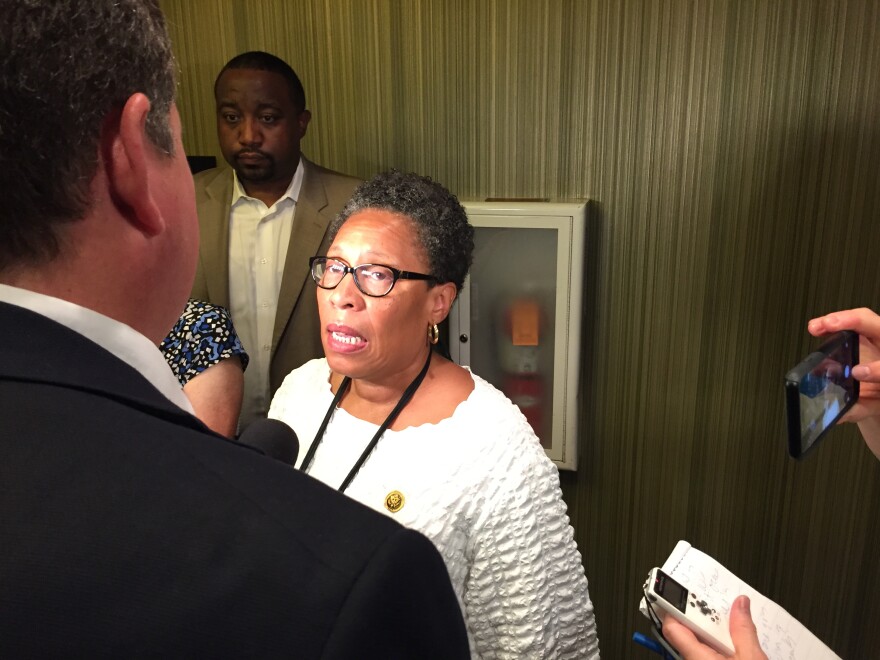Ohio’s 16 congressional races have gotten little notice this year. That’s because none of the seats are competitive. For Ohio Public Radio, WCPN’s Matt Richmond has this story on two Ohio districts and how the incumbents are spending their time in Washington.
Marcia Fudge,Democratic congresswoman for the 11th District, represents the east side of Cleveland down to part of Akron.

“We pick presidents, that’s what we do…”
Besides making the campaign rounds with national figures like Clinton and President Barack Obama, Fudge is up for reelection. But she isn’t holding rallies in that campaign and probably doesn’t need to. Since taking the seat in 2008, she’s won with as much as 85 percent of the vote. The last election in 2014 was the congresswoman’s weakest showing: her margin of victory was 59 points.
Inside Washington
Fudge says she’s not taking that support for granted.
“I go to every kind of event I can possibly go to. I'm active in speaking in schools. I'm active with the universities, with businesses. It's easy to keep a connection when you spend a lot of time with your people.”
Fudge has used her time in Washington to move up in the party. She’s chaired the Congressional Black Caucus. She gaveled in the proceedings at this year’s Democratic National Convention. In a political climate that could be summed up as ‘throw the bums out,' Fudge defends her status in the Capitol.
“How do you think I was able to bring back $5 billion without earmarks? It's because of relationships. It's because people trust what I say. They respect what I do. They know that I work very, very hard for the people that I represent.”
Fudge says she comes back from Washington every weekend. She staffs her office with specialists in veterans affairs, seniors issues and education to help with constituent concerns. During her eight years in office, Fudge has been the primary sponsor of only one bill that passed the House. It was a fire prevention program, establishing grants for the installation of sprinkler systems in college dormitories.
David Cohen of the University of Akron's Bliss Institute for Applied Politics says these days it’s not about getting laws passed.
“There's an old saying in Congress that every member of Congress knows: 'Before you save the world, you have to save your seat.' And so the re-election priority overwhelms everything.”
Cohen says members from district’s like Fudge’s and Republican Jim Renacci’s 16th District have to worry more about getting ‘primaried’ from the left or right of their parties.

Part of the GOP sweep
Renacci is a former car dealership owner who arrived in Congress in 2010, representing a suburban district west and south of Cleveland. His business was closed as part of General Motors’ government-assisted bankruptcy the year before. Renacci says that ordeal led him to run for Congress.
“I was concerned about the growth of the federal government and how it had now infringed into my personal life and my business life and how it was now infringing into others.”
After he got to Washington, there was only one place to go: the powerful Ways and Means Committee, where tax law is written.
“Most people do not get on the Ways and Means committee for ten or twelve years. I continued to push my background, my experience, I went to members of the Ways and Means Committee, showed them how I could help. I went to the leadership.”
He’s since introduced a tax plan. It would eliminate the corporate tax, replace it with one on consumption and simplify income taxes into three brackets. Cohen, however, says this is little more than a stunt to keep Renacci on the campaign trail.
“I put together a tax plan. I introduced this plan into Congress. I sponsored this or I co-sponsored this. I wrote this or I co-wrote this. Look at all the important things I've tried to do. If only I had a Republican president in office.”
It’s easy to forget this year, but Representatives Renacci and Fudge do have opponents. But both do face competition: The Democrat running against Renacci is Keith Mundy; the Republican running against Fudge is Beverly Goldstein.
This story is part of WKSU and ideastream’s election collaborative.





